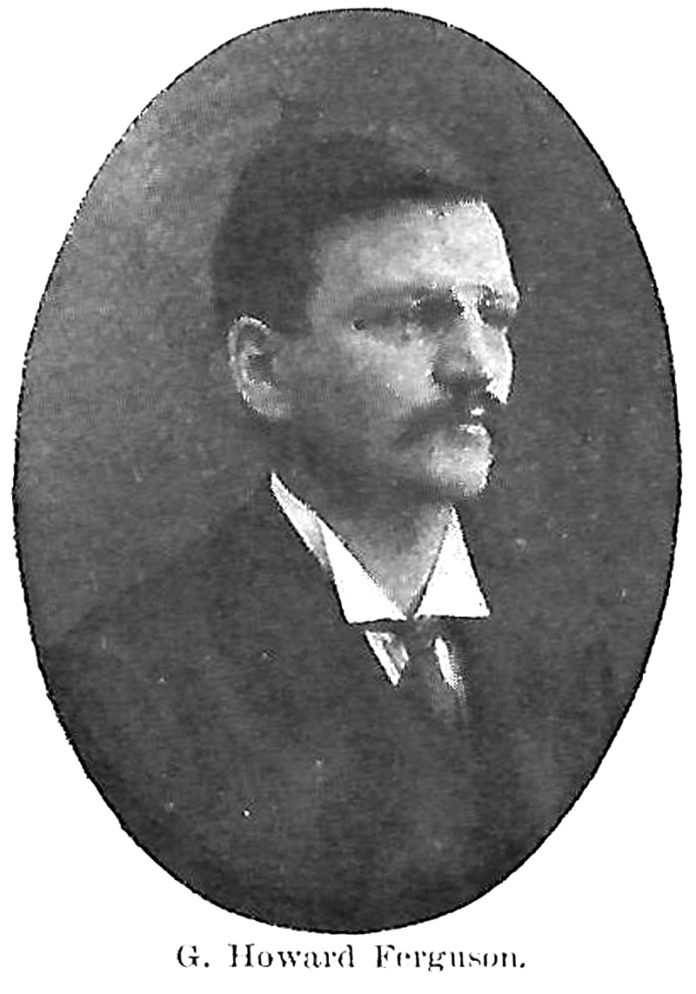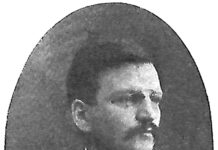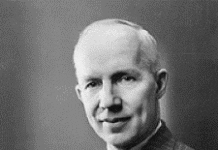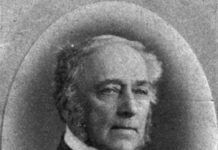Once the 24 year-old, newly qualified lawyer moved back to Kemptville following the death of his last surviving brother in 1894, G. Howard Ferguson was, almost inevitable, going to enter politics. After all, his father was the Member of Parliament for the riding, and had been for twenty years, and Howard’s own duties as a small-town lawyer and money lender took up little of his time and energies. In 1896, two major events took place in Howard’s life: his father retired from Parliament, and Howard married Ella Cumming, a long-time love and daughter of a local merchant.
In 1897, Howard announced that he would run for the Kemptville Village Council, and no-one was surprised when he won the election easily. In those days, municipal elections took place annually, and Howard was one of two new members on council in January, 1898. He very soon made his presence felt, showing personality traits, and political instincts, that would re-emerge repeatedly for the rest of his life.
Howard served as a councillor until 1901, then he began three years as Reeve of Kemptville, and during those years he initiated many projects that we still have the benefit of today. In 1900, he campaigned to have a library in the village, and he was successful in establishing it in a room in the Fraser Block, today the location of Rotary Park. Howard served as the first Chair of the Library Board.
As Reeve, Howard negotiated the sale to the Village of Riverside Park, which, up until then, had been outside the village boundaries since Kemptville had separated from Oxford-on-Rideau Township in 1857. The purchase of Riverside Park by Kemptville caused a great deal of annoyance in Oxford-on-Rideau, where the Council demanded that the Village pay them full property taxes on the land. Arguments were raised on both sides, and it was even considered that the Park might be annexed to Kemptville. The solution was found in 1905, when, by a public vote of taxpayers in Kemptville, a Parks Commission was established under the Public Parks Act, whose mandate was to operate the park for the community, with a strict limit on expenditures of tax money.
The Village Council also began a series of infrastructure programs, again initiated by Howard, and usually opposed by other, and older, members of council, as being too expensive. These included replacing much of the old plank sidewalks in the village with concrete ones, improving the road that ran between Kemptville and Beckett’s Landing, along which ran the main highway to Ottawa, and paving the road between the village and the train station at Bedell.
His most controversial project was the replacement of the old swing bridge at Clothier’s Mill, which led to serious confrontations, resignations and litigation within the ranks of the council. The new bridge was replaced in 1959 by the current one on Bridge Street. This issue has been covered in previous articles, but the political machinations of Howard Ferguson during his years on council showed to all that he was unwilling to act as a junior partner, impatient with older and more experienced men, in short, a rather arrogant and pushy young man in a hurry.
By 1902, Howard was looking to a wider sphere of political activity: he decided to run for the Ontario Legislature. It might have been expected that he would run for his father’s old seat in the federal Parliament, but the sitting M.P., Dr. John Reid, was both able and popular and was willing to support Howard for the provincial seat. That too, as it happened, was held by a Conservative: Robert Joynt, from Augusta Township. Here, once again, Howard showed ambition, impatience, and a ruthlessness that would characterise his entire political career, from backbench M.P.P. to Premier of Ontario, and even on to London, where he would serve as Canadian High Commissioner to the Court of St. James.
His first attempt to wrest the Conservative nomination from Joynt failed, but he learned the lesson, and succeeded in winning the nomination, and the seat, from Joynt after first causing deep divisions within the riding association and facing accusations by Joynt of having, literally, bought the votes that got him nominated. It was not the last time that G. Howard Ferguson was accused of skulduggery during his political life; but he never minded such attacks. He rode roughshod over them and between 1905 and 1914, as a backbencher, acted as the “Tory Hatchet Man” for his leader. In 1914 he entered Cabinet, and in 1923 became Premier, where he remained until he retired in 1930. That career at Queen’s Park is worth another chapter.









